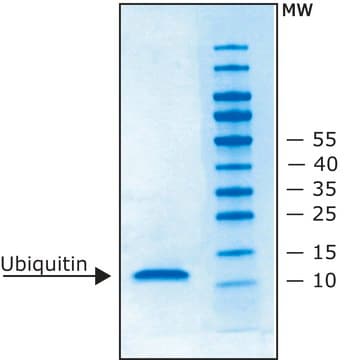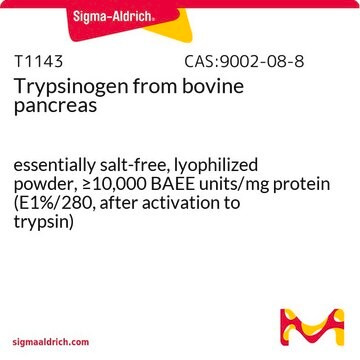U6253
Ubiquitin from bovine erythrocytes
BioUltra, ≥98% (SDS-PAGE), essentially salt-free, lyophilized powder
Synonyme(s) :
ATP-dependent proteolytic factor, Ub
About This Item
Produits recommandés
Source biologique
bovine erythrocytes
Niveau de qualité
Gamme de produits
BioUltra
Pureté
≥98% (SDS-PAGE)
Forme
essentially salt-free, lyophilized powder
Conditions de stockage
(Tightly closed. Dry)
Technique(s)
western blot: suitable
Impuretés
salt, essentially free
Solubilité
water: 1 mg/mL, clear, colorless
Numéro d'accès UniProt
Température de stockage
2-8°C
Informations sur le gène
bovine ... LOC(101902760)
Vous recherchez des produits similaires ? Visite Guide de comparaison des produits
Catégories apparentées
Description générale
Ubiquitin is a highly conserved regulatory protein. It is found in all eukaryotic cells and is virtually identical across all forms of life including yeast, humans, and plants. ubiquitin structure contains seven Lys residues and an N-terminus, all of which are target sites for ubiquitination.
Application
Ubiquitin from bovine erythrocytes can be used for in vitro ubiquitinylation assay. The product can also be used as a marker in western blotting.
Actions biochimiques/physiologiques
Notes préparatoires
Anticorps
Code de la classe de stockage
11 - Combustible Solids
Classe de danger pour l'eau (WGK)
WGK 3
Point d'éclair (°F)
Not applicable
Point d'éclair (°C)
Not applicable
Équipement de protection individuelle
Eyeshields, Gloves, type N95 (US)
Certificats d'analyse (COA)
Recherchez un Certificats d'analyse (COA) en saisissant le numéro de lot du produit. Les numéros de lot figurent sur l'étiquette du produit après les mots "Lot" ou "Batch".
Déjà en possession de ce produit ?
Retrouvez la documentation relative aux produits que vous avez récemment achetés dans la Bibliothèque de documents.
Les clients ont également consulté
Notre équipe de scientifiques dispose d'une expérience dans tous les secteurs de la recherche, notamment en sciences de la vie, science des matériaux, synthèse chimique, chromatographie, analyse et dans de nombreux autres domaines..
Contacter notre Service technique








